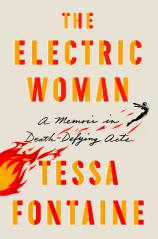Excerpt
Excerpt
The Electric Woman: A Memoir in Death-Defying Acts

THE ARCHITECTURE OF A WAVE
One day after the stroke
October 2010
Her arms were tucked against her sides. She had been arranged.
“Prepare yourself,” my stepdad, Davy, whispered into my hair when he hugged me outside her hospital room. I’d just arrived from across the country after a night of emergency phone calls. I was not prepared. My mom was in a hospital bed, covered in machines. There were remnants of fluid, blood and yellow secretions, dried all along her head. A ventilator taped across her mouth pulled her skin taut.
I started to whisper something to Davy, but he stopped me. “She can’t hear you,” he said. “She won’t wake up.”
“Until when?” I asked.
He let out a sigh that caught in his throat halfway, the air turning into a sob that turned into a cough that turned into silence. We stood beside one another, not touching.
She was in an induced coma. They had filled her with barbiturates to knock her out. That’s what a nurse told me, when I asked, after being in the room with my mom for ten minutes and then fleeing to find some goddamned information. I pinched and pinched and pinched myself.
“What is happening?” I asked another nurse. She squeezed my shoulder like a football coach.
An induced coma reduces the rate of cerebral blood flow. After her blood slowed, they hauled out the chain saw. I do not know if they actually used a chain saw. Probably not. But it had to have been a big saw to cut away half of a human skull.
When I came back to her room, Davy, my aunt, and my uncle stepped outside.
“We’ll give you a few minutes alone,” they said. “To say what you need to say.”
* * *
Two weeks before, a handwritten note had arrived from her that said, for no reason, she was proud of me.
* * *
I walked into the room. Sat in a chair beside her bed. I knew she would not open her eyes. She would not say babygirl, that high-pitched, delighted greeting that was all mine.
The bandage covering her head poofed out over the opened area because her brain was so swollen, because the bleeding would not stop. It looked like a piece of popcorn that had begun bursting from its kernel. Her head was shaved.
Her hospital-room window looked out onto the roof of another building, a large, flat rectangle coated with something like pressed gravel. There were seven seagulls standing on the roof. Fat, white bodies with bright orange beaks and spindly legs.
She had had a hemorrhagic stroke.
I needed to say the important stuff.
* * *
“Mom,” I said, touching her arm. All my insides were aflame.
I kept my hand on her arm. The ventilator wheezed. Took my hand off to cover my mouth. I thought I’d scream. I thought I’d throw up every single thing I’d ever eaten. I needed to tell her the things I’d done such a shitty job telling her. Open. Your. Mouth. Speak.
The fire in my lungs turned to ash. Every word I’d ever known was burned.
Out the window, the seagulls were all facing the same direction. Seven seagulls, evenly spaced, their faces pointed the same way. I stood up and looked where they were looking. A parking lot, scattered trees, a road. I didn’t believe in omens.
Davy came in and sat beside me. He gave a few details. The very private specifics of an emergency.
The vomit and shit when he’d walked into their bedroom.
The eyes rolled back in the head.
The speed with which the paramedics came.
The unknowing at the hospital.
The chaplain assigned to him as he waited.
“When I saw the chaplain, I knew,” he said. “That’s when I knew how bad it was. I didn’t know until then, but it was the chaplain that made me understand. The hospital assigns them to families who are losing someone. Even after I said no thanks to his counseling, no to prayers or hand-holding or any of that shit. He kept coming back, checking on me, asking how Teresa was doing. So I knew. They thought she’d die for sure.”
His voice was steady this entire conversation—the shock of it, maybe. The up-all-night-at-the-hospital of it.
The gulls were not facing the window. That would be too obvious. An omen.
Outside, there were bay trees and beyond that the dried-out October hills and far beyond that, twelve miles at least, the Pacific, which is where those birds must have come from originally. And if that was true, if they’d left the salt and spray, taken wing from the smooth sand, found wind to ride and flapped and let their feathers carry them here, then were they here for her? Did they know? Did they come to guide her back to the ocean?
* * *
The water is clear and the sand is warm and every morning, before going to work at the travel agency, she slices into an orange-pink papaya. She eats half for breakfast, spooning out the flesh in big hunks, wiping her chin with the back of her hand, because there is almost too much juice, too much perfume, because it spills over no matter how careful she is.
But she is not going to work.
She’s nineteen and about to climb onto a surfer’s shoulders out in the turquoise waters of a Hawaiian beach. Her name is Teresa.
There’s a crowd gathering on the sand. She steps into the ocean beside the surfer, paying no attention to the small sharp shells beneath her feet.
Out into the water then, deeper, until it is time to paddle.
They climb onto the board belly-first, she below, the surfer on top of her, two sets of arms paddling in tandem. They must move with one another like oars along a canoe. Over the break, farther out to the point where the waves begin swelling enough to catch.
They are so far out, and then a little farther, and a little farther still. They turn their board toward the shore. She can feel her heart hammering against the wood. Waves pass beneath them, lifting the back and then the front in a gentle roll.
Mornings when they practice, gulls swoop nearby, small clear fish move in clouds. The pincushion sea stars wink and wave.
A big swell nears. Teresa looks over her shoulder a few times, checking to see how quickly the wave approaches, how it is rising. The audience holds their hands above their eyes to block the glare. They are ready to be amazed.
The wave catches hold of the board with a little tug and they begin to fly. She presses herself up, stands quickly, and the surfer behind her does as well. He grips her by the waist.
She springs up and he lifts her, one fluid motion, her body rising from the board and into the air, her feet at his knees and then she’s nearly to the sky, touching the sun, her head and shoulders bent back as he lifts her waist above his head and then plants her on his shoulders. Her legs bent around his chest, she lifts her arms in the air, sitting high above the water.
She smiles and waves for the audience. They cannot hear the blood roiling in her temples, the nerves, they cannot feel her hammering heart. She performs fearlessness. The board is unsteady atop the water and the surfer’s legs shake with the effort of balance and she quivers as she flexes her muscles to stay upright, she must stay upright, and still, she keeps one arm up, up, up toward the sky, that kind of queen, pointing at the sun, that high.
Copyright © 2018 by Tessa Fontaine
The Electric Woman: A Memoir in Death-Defying Acts
- Genres: Memoir, Nonfiction
- paperback: 384 pages
- Publisher: Farrar, Straus and Giroux
- ISBN-10: 0374538409
- ISBN-13: 9780374538408







